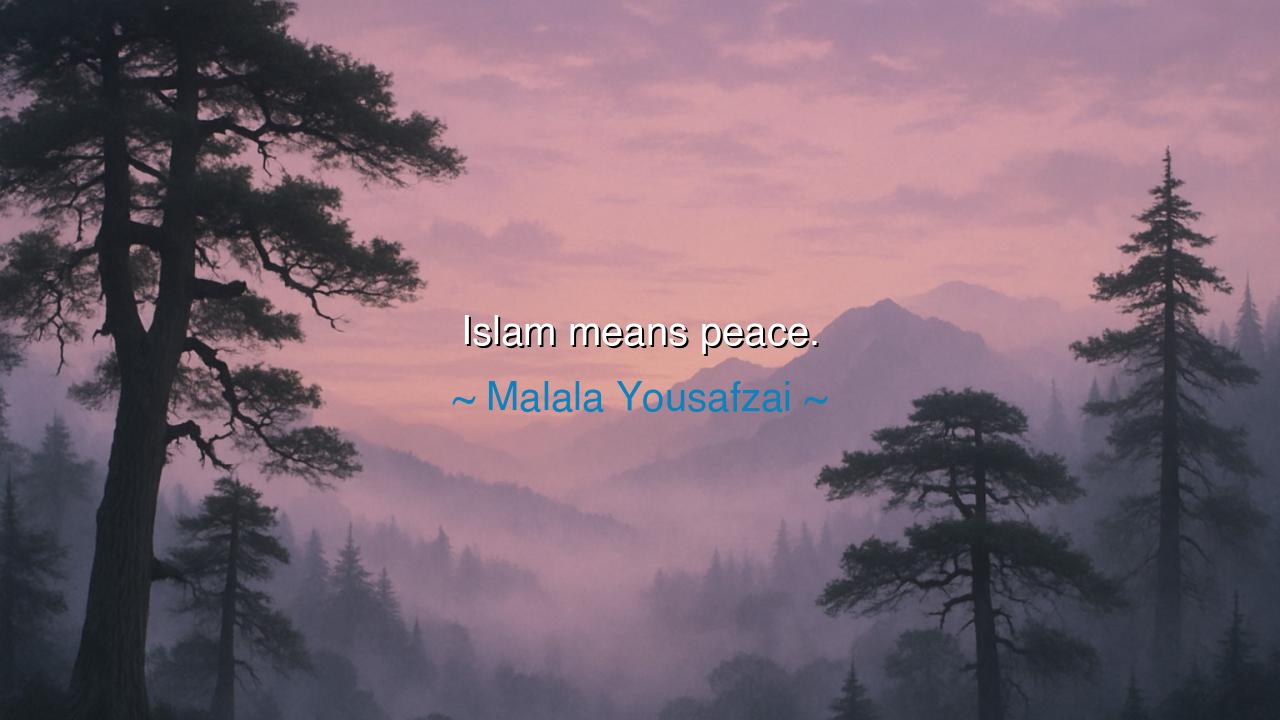
Islam means peace.






“Islam means peace.” Thus spoke Malala Yousafzai, the young voice of courage who rose from the shadows of violence to proclaim wisdom before the nations. Her words, simple yet profound, call us back to the very essence of a faith often misunderstood. In them lies not only etymology but truth: that the root of Islam is salaam, meaning peace, surrender, and harmony with the Divine. Malala reminds us that at its heart, Islam is not the sword of destruction but the path of reconciliation—between man and God, and between man and his fellow beings.
When she declares that Islam means peace, she speaks against the distortions that twist religion into violence. For Malala herself bore the wounds of hatred, struck by those who claimed to act in the name of the faith. Yet she, more than they, knew the true meaning of her heritage: that Islam, like the river, is meant to nourish, not to drown; to heal, not to destroy. In her words resounds the cry of a generation who will not let faith be defined by fear, but reclaimed as the path of peace it was always meant to be.
History bears witness to this truth. In the early days of Islam, the Prophet Muhammad—peace be upon him—entered into treaties with neighboring tribes, emphasizing trust, protection, and coexistence. The Constitution of Medina, one of the earliest charters of pluralism, guaranteed mutual respect between Muslims, Jews, and others living in the city. Though wars came, they were never the essence; the essence was always peace. This was the spirit that spread the faith across continents—not only through conquest, as some imagine, but through merchants, scholars, and mystics whose conduct drew hearts to the beauty of Islam’s message.
Consider also the story of Saladin, the great Muslim leader of the Crusades. Though engaged in fierce battles, he became renowned not for cruelty but for mercy. When Jerusalem fell into his hands, he spared its people, allowing them to depart in safety, unlike the massacres committed decades earlier. His honor and his restraint revealed the heart of his faith: not vengeance, but peace and dignity even toward former enemies. Such stories remind us that Malala’s words are not naïve—they are woven into the very history of Islam.
And yet, Malala’s statement is more than history—it is a challenge to the present. For too often men of all faiths have used religion as a cloak for ambition, a banner for hatred, a weapon for power. In such hands, even the word “peace” can be twisted into war. But her voice pierces through the noise, calling us to remember that no faith, especially one whose very name is peace, should be hijacked by violence. In her testimony lies a call to all people: judge a tree not by the words of those who misuse it, but by the fruit it was meant to bear.
The lesson for us is this: if Islam means peace, then let us look to our own lives and ask—does our faith, whatever it may be, bear the fruit of peace? Do our actions sow harmony, or do they plant seeds of division? Malala teaches that peace is not passive—it is a choice, an active labor of forgiveness, understanding, and justice. To claim faith without practicing peace is to betray its essence.
Practical wisdom flows from her words: in your family, be the one who ends quarrels rather than prolongs them. In your community, extend respect to those who are different, for peace begins in the small acts of daily life. In your own heart, cleanse resentment, for the inner battlefield must be won before the outer one can ever be healed. For Malala’s wisdom reminds us that peace is not only the meaning of Islam—it is the meaning of humanity itself.
Thus let her words endure: “Islam means peace.” A truth that transcends one faith and speaks to all. If peace is at the heart of our religions, our cultures, our lives, then we must live it, protect it, and spread it like a light in darkness. For in peace lies the fulfillment of every teaching, the answer to every prayer, and the path to a world where, at last, the song of harmony replaces the clamor of war.






AAdministratorAdministrator
Welcome, honored guests. Please leave a comment, we will respond soon